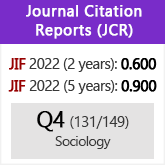El suicidio en Durkheim, o la modernidad de la triste figura
DOI:
https://doi.org/10.3989/ris.2001.i28.743Keywords:
Sociological Theory, Social Cohesión, Sociology of Emotions, Individualism, AnomiaAbstract
From a sociology of emotions perspective, this article proposes a new interpretation of Durkheim' suicide theory. Despite the positivistic approach that inspired his empirical analysis, a detailed review of his theoretical model shows that the main objective of his work was to prove the social causation of emotions. Furthermore, an analysis of the emotions that pervades Durkheim' Suicide is very useful to specify, without ambiguities, the integrative and regulative forms of social cohesión, which are at the base of his suicide typology (altruist/egoist and fatalist/anomic). Integration is related to the intercommunicative dimensión of social order, henee the fact that this form of social cohesión was linked to shame and pride emotions. Regulation is related to the Interactive dimensión of social order, henee the fact that this form was linked to anger and frustration emotions.
Downloads
Download data is not yet available.
Downloads
Published
2001-04-30
How to Cite
Bericat Alastuey, E. (2001). El suicidio en Durkheim, o la modernidad de la triste figura. Revista Internacional De Sociología, 59(28), 69–104. https://doi.org/10.3989/ris.2001.i28.743
Issue
Section
Studies
License
Copyright (c) 2018 Consejo Superior de Investigaciones Científicas (CSIC)

This work is licensed under a Creative Commons Attribution 4.0 International License.
© CSIC. Manuscripts published in both the printed and online versions of this Journal are the property of Consejo Superior de Investigaciones Científicas, and quoting this source is a requirement for any partial or full reproduction.All contents of this electronic edition, except where otherwise noted, are distributed under a “Creative Commons Attribution 4.0 International” (CC BY 4.0) License. You may read here the basic information and the legal text of the license. The indication of the CC BY 4.0 License must be expressly stated in this way when necessary.
Self-archiving in repositories, personal webpages or similar, of any version other than the published by the Editor, is not allowed.

















